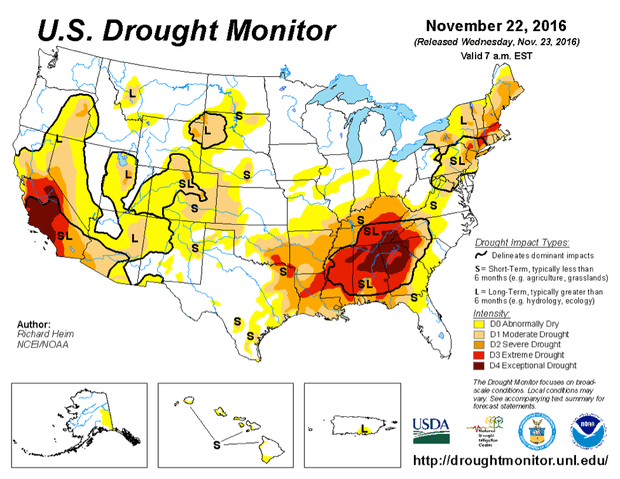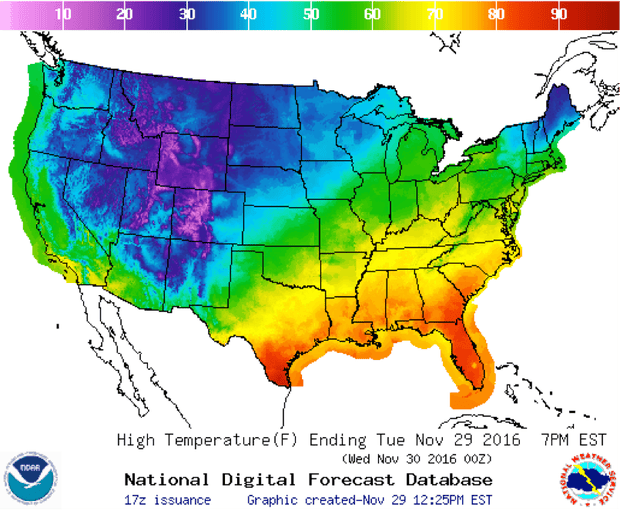Fires and drought cook Tennessee - a state represented by climate deniers
Posted on 2 December 2016 by John Abraham
With my new hope that deniers of climate change will take ownership of the consequences, I am sad to report that this week, terrible wildfires have swept through Tennessee, a southeastern state in the USA. This state is beset by a tremendous drought, as seen by a recent US Drought Monitor map. There currently are severe, extreme, and exceptional drought conditions covering a wide swath of southern states. The causes of drought are combinations of lowered precipitation and higher temperatures.

The patterns of drought are the result of many weeks of weather (warm and dry) that have led to the current conditions. The recent high-temperature map from NOAA below provides just one example.

Why do we care about the crazy drought in the southern USA? Because it leads to bad consequences. As I write this post, we can read about the horrific fires in Tennessee that are destroying both natural habitat as well as towns and economies. A video about Gatlinburg Tennessee fires can be seen here. There, wildfires are threatening the resort town. It is too early to tell what economic damages will result.
Was this fire caused by climate change? The answer is yes. We are now in a world where all of our weather is impacted by humans. We know human-caused warming is making drought and heat more severe – that leads to fires like the one we are seeing. We also know that 2016 will be the hottest year ever recorded and the first time temperatures have reached the critical mark of 1C (1.8F) above normal.
Of course we feel sorry for the folks who are affected by the wildfire in Tennessee. But, Tennessee has not helped itself. In 2012, Tennessee passed a lawencouraging teachers to present alternative reasons for climate change, even though those views are not supported by science.
Here are some insightful comments from legislators in Tennessee, as reported by Bill Moyers (found here).
- Rep. Diane Black (R-TN-06): “The far left-wing elements of this administration foresee a near future with carbon regulated as a pollutant and heavily taxed to discourage consumption and generate revenue. We must resist all of these radical approaches all geared to raise energy prices on American families and businesses.” [Project Vote Smart Issue Position]
- Rep. Marsha Blackburn (R-TN-07): “[T]here is not consensus [on climate change] and you can look at the latest IPCC Report and look at Doctor Lindzen from MIT. His rejection of that or Judith Curry … from Georgia Tech. There is not consensus there.” [The Wire, 2/17/14]
- Rep. John J. Duncan Jr. (R-TN-02): On his website, Duncan lists five scientists that claim global warming is not real, including how global warming is “the greatest scam in history.” [Duncan Website]
- Rep. Chuck Fleischmann (R-TN-03): When asked his opinion about global warming during a candidate debate, Fleischmann said: “I think we ought to take Al Gore, put him on an iceberg, and put him way out there.” [Times Free Press, 7/5/12]
- Rep. Phil Roe (R-TN-01): “Many believe greenhouse gas emissions are contributing to the gradual warming of our planet and changing of our climate. While there are many questions surrounding the science of the issue, it seems to me like we could develop a solution that will reduce greenhouse gas emissions without inflicting catastrophic damage on our economy.” [Project Vote Smart Issue Position, 1/1/11]































 Arguments
Arguments






























There could be a case for teaching some sceptical climate science ideas in schools, along with the basic consensus, but it depends how its done. School children are not dumb, they know science is very certain about some things, but is a work in progress. They will hear climate sceptic ideas from various people and cant be insulated from this.
Maybe schools should teach the basic IPCC consensus, but also include the more credible sceptical arguments, but also point out the flaws in those arguments. That is the important thing, showing the flaws. If anything it would become a lesson in the poor logic and rhetorical fallacies you get in many denialist positions. It would lead to a better educated generation.
I decided we are warming the climate after a close look at both sides of the debate. I take nothing for granted. Children in the final two years of secondary school are mature enough for this approach.
But of course the problem is getting schools to teach the flaws in sceptical climate opinions, and not promote them as equally valid alternatives. And that would not be easy, judging by the opinions of some of those legislators in the article above.
Let those kids sweat! In addition to teaching them about various aspects of climate change (physics, geology, carbon cycle, carbon isotopes, weathering chemistry, etc), double burden them with sceptics' points and how these have been debunked.
@1 nigelj - I know that myself and other astronomers that teach college general education-level astro courses, when we touch on planetary atmospheres and greenhouse gases we include AGW in our courses. It's nice that the textbook (Bennett et al.) also touches on it explicitly.
A lot of us consider it an obligation! And I do expose as I go through it each time the skeptics use a blatant falsehood.
But having been exposed to that earlier, for e.g. in a high school earth science course, I imagine would be better, and tougher to achieve :(
It is a bit like allowing the teaching of creationism. Yes, let it be taught but in the next or the same lesson, take the kids to a carbon dating laboratory and have the head honcho in the lab explain how it is done and what the results say about a minimal estimate of the age of the earth (50,000 years just from carbon dating). Then let him explain how longer term dating is done with other isotopes and to what extent this provides a much longer minimal estamate of the age of the earth. nothing wrong with letting these alternative world views be taught but then take off the kid gloves and give the kids the true story and the evidence on which the scientists base their world view. A great teaching oportunity.
"Was this fire caused by climate change? The answer is yes. "
Simple as that! And then ask: Is this climate change caused by human activity?
Where is the evidence?
topal@5,
This is just a trivial (or maybe sarcastic on your part?) question on this site. Just look for any argument among 150+ argument in the myth debunking "thermometer" on the top left. Or look at this post for a comprehensive summary of AGW indicators. That's why 97% of people who have the undestanding of these facts (incl. climate scientists) do accepts them.
JW Rebel @2. I hear you and you may ultimately be right. However I still think theres a case for examining both the IPCC conclusions and the saner sceptical positions. We are having this educational debate in my country on how to strike the right balance between rote learning, creative thought, and critical analysis. Im convinced it needs a mixture of all three. Its not an "either / or" thing.
This is where I was coming from, and its hard to see why some student critical analysis should not be applied to the big issuess of the day. However it would have to be in the final year of school as younger students can only really absorb basic information. Critical analysis would bamboozle them.
And special emphasis needs to be placed on the evidence based approach of mainstream science as opposed to the less rigorous thinking around something like "creationism" and the sophistry or appeals to emotion you get in some climate denialist positions.
Topal @5, you want to know where is the evidence we are changing the climate? Why dont you do a google search or read the IPCC reports or articles on this website. You are presumably familiar with search engines. Its just annoying that you expect people to repeat all this on this comments box and waste their time when the information is already out there and easy to find.
Your post was also pure rhetorical questions. This becomes annoying when there are just purely rhetorical questions. This is not a teacher / student website. This is a discussion, news posting and debate forum like many others, and Im interested in peoples opinions or genuine questions if they dont know something and have already tried google. I ask a few myself.
Nigelj,
Keep in mind that the majority of scientific opinion is towards more damage from AGW than the IPCC reports. The IPCC reports the minimum consensus that scientists agree on. Most scientists think there will be more damage than reported by the IPCC.
For example, this Real Climate post reviews expert opinion on sea level rise and compares it to the IPCC report. The majority of scientists think sea level rise will exceed the IPCC projections. If we are going to consider the "saner" skeptical reports we need to also cover Hansen's projection of 5 meters of sea level rise by 2100. Hansen has more scientific support than the skeptical reports.
I teach High School (and college) in the USA. If you want schools to cover AGW you must accept that probably half of Science teachers do not understand the problem and will think the sketical arguments make sense. We used to have an AP Physics teacher (the highest level of Physics in High School) who taught his students that AGW could not occur because the absorbtion spectrum was saturated. He is no longer at our school but teaches at another school nearby.
Topal #5
Actually the answer to your question is "mostly no". The fire was likely caused by a careless human, or a malicious one. Global warming could have contributed to making the conditions of the fire worse.
Besides real scientists rarely answer with an unqualified "Yes!" or "No!" to any question of contemporary science.
Michael Sweet @9, I agree the IPCC are conservative, partly because their reports have to be signed off by governments, and some of these have interests in playing down climate change. This conservatism should certainly be pointed out to school students.
I suppose the question is whether to teach about global warming in school, and also secondly whether to include both the mainstream and skeptical views. Whatever is done will have positives and also problems, as you point out some of the problems. However I believe ignorance is not bliss, and the basic mainstream science should be taught, and also some of the sceptical positions should be acknowledged.
If students feel they are getting too brainwashed into just the mainstream position this could have the unintended effect of making them sceptical and they will read nonsense in their own time uncritically. Better to show them the sceptical arguments at school and their weaknesses.
Of course I'm being idealistic. It would not be easy to get schools to do any of this correctly. But maybe it should be tried.